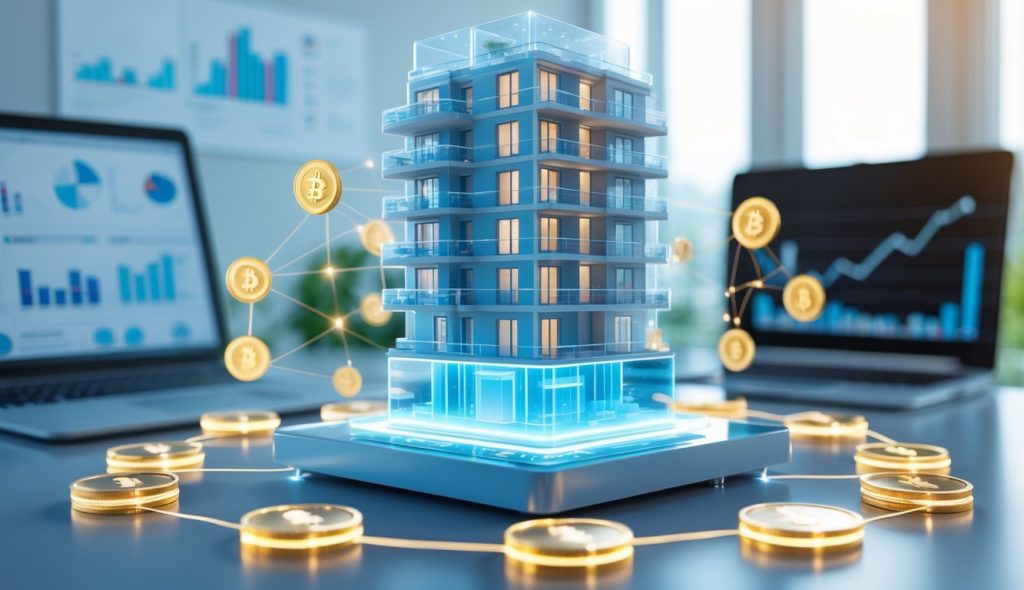Fractional Real Estate Tokens in the Crypto Space

Exploring fractional real estate tokens offers a new way to participate in property investment using the power of blockchain technology. These digital assets let you own small portions of real estate, providing an alternative to traditional real estate investment and potentially diversifying your portfolio. Making small, incremental tokenized real estate investments makes it easier to learn more about the world of property investment and master new strategies for your investment goals.
As the real estate market evolves with technological advances, you need to understand the benefits and risks of fractional tokens to make smart decisions. Staying informed helps you stay ahead of the curve and evaluate whether these opportunities fit your investment strategy.
Key Takeaways
- Fractional real estate tokens offer unique ways to invest in property.
- Understanding benefits and risks is crucial in this evolving market.
- Staying informed helps you evaluate and pursue modern investment options.
What are Fractional Real Estate Tokens?
Fractional real estate tokens are digital assets that give you ownership of a specific portion of a property. By using blockchain technology, these tokens make property ownership possible in smaller, tradable parts.
- Each token typically represents a clearly defined share of real estate value.
- Smart contracts automate transactions, reducing paperwork and increasing security.
- Blockchain platforms provide transparent records of all trades and ownership.
You can invest in real estate with less capital and greater flexibility, benefiting from platforms that handle tokenization and secure trading. https://www.youtube.com/embed/6cCkimumA6Y?feature=oembed
Benefits of Tokenized Real Estate
Tokenized real estate makes high-value properties more accessible by allowing you to purchase fractional ownership, significantly lowering the entry barrier. This democratizes real estate investing, opening the market to a wider range of participants globally.
You benefit from enhanced liquidity, as you can trade these tokens more easily than traditional property shares, enabling greater flexibility in portfolio management and faster income distribution. Blockchain’s transparency creates a secure and immutable transaction log, which improves trust and accountability for all investors, including in off market real estate deals.
Key Advantages
| Benefit | Description |
|---|---|
| Liquidity | Trade tokens with ease for improved market participation |
| Efficiency | Faster processes using blockchain and smart contracts |
| Transparency | Immutable records enhance trust and accountability |
| Accessibility | Lower investment minimums enable broader participation |
| Portfolio Diversification | Spread risk by holding diverse real estate assets |
This approach is scalable, supports direct income from rental distributions, and streamlines property transactions, making real estate investment more efficient and inclusive.
Risks of Real Estate Tokens

When you consider real estate tokens, you face a range of risks that can affect your investment. Market volatility plays a significant role in determining token values, with prices impacted by market fluctuations and speculative activities—similar to other crypto assets.
Regulatory compliance can be complex due to ongoing changes in regulations, unclear legal frameworks, and the need for robust Know Your Customer (KYC) and Anti-Money Laundering (AML) procedures; failure to meet these requirements may introduce legal challenges.
| Risk Area | Details |
|---|---|
| Security | While blockchain adds transparency, fraud and scams remain possible. |
| Market Volatility | Token values are highly sensitive to market fluctuations. |
| Regulatory Compliance | Adapting to new rules, including KYC and AML, can be costly and challenging. |
If the market does not broadly adopt this technology, it may further undermine the stability and potential returns of your investment. For a deeper look at challenges like regulatory hurdles and legal considerations, see Coinmetro’s discussion on tokenized real estate risks.
Navigating the World of Fractional Real Estate Tokens
When you explore fractional real estate tokens, pay attention to important factors such as community involvement, the strength of the ecosystem, and the usability of platforms like Ethereum.
- Secondary markets offer added liquidity, making it easier to buy or sell your stake.
- Platform reputation and market adoption provide key indicators of stability.
A table below outlines essential considerations:
| Consideration | Why It Matters |
|---|---|
| Community | Informs token credibility |
| Ecosystem | Impacts long-term viability |
| Ethereum | Popular blockchain for tokens |
| Secondary Markets | Enables easier trading |
| Market Adoption | Signals potential for growth |
Frequently Asked Questions
What are the basic steps involved in tokenizing a real estate asset?
Tokenizing a real estate asset typically involves these steps:
- Asset Selection: Choose the property to tokenize.
- Legal Structuring: Establish legal ownership and compliance frameworks.
- Valuation: Determine the value of the property for accurate token issuance.
- Token Creation: Use blockchain technology to issue digital tokens, each representing a fractional share in the property.
- Distribution: Offer the tokens to investors through platforms that support real estate tokenization.
- Trading and Management: Enable secondary trading of tokens and manage distributions (like rent) via smart contracts.
Which platforms specialize in the tokenization of real estate and how do they differ?
Several platforms focus on real estate tokenization, offering different features:
- Tokeny – Delivers regulatory compliance and flexible structuring.
- RealT – Focuses on residential properties in the U.S. and seamless rent distribution.
- Zoniqx – Provides a technology-driven solution with customizable token issuance options.
- Securitize – Supports a broad range of assets and integrates compliance.
What are some examples of successful real estate tokenization projects?
- Aspen Digital: Tokenized ownership in the St. Regis Aspen Resort.
- RealT Properties: Ongoing tokenization of single-family homes in the U.S.
- Myco: Tokenized commercial properties in Asia and Europe.
These projects highlight how diverse properties and geographic locations participate. Some projects enable global investors to participate directly with small capital amounts.
How does the valuation of tokenized real estate compare to traditional real estate?
The initial valuation process mirrors traditional methods—market analysis, appraisals, and due diligence. However, blockchain-based trading and real-time price discovery can increase price transparency for tokenized assets.
What impact has tokenization had on the liquidity of the real estate market?
Tokenization generally increases asset liquidity by enabling investors to trade smaller, fractional ownership interests on digital platforms. This lowers the barrier to entry for investors and enables quicker transactions compared to traditional processes.
How do regulatory frameworks affect the trading of tokenized real estate items?
Regulation significantly influences the adoption and success of tokenized real estate. Jurisdictions impose different requirements regarding investor eligibility, anti-money laundering (AML) checks, and securities registration.
You must ensure compliance with local laws, which may impact who can participate and how tokens are traded. Some platforms integrate compliance measures into their services, while others work with regulatory agencies to clarify guidelines.
Wondering where the savviest investors find their best deals?
Access the largest database of foreclosure properties nationwide and discover below-market deals before other investors. Start your search today!
Dive deep into the world of real estate investment with this comprehensive case study that brings theory to life.
Investment Real Estate Analysis: A Case Study offers an unparalleled look at the decision-making process behind successful property investments. Follow along as we dissect a real-world scenario, revealing the critical factors that seasoned investors consider before making a move.
From crunching numbers to assessing market conditions, this book walks you through every step of the analysis process. Learn how to evaluate potential investments like a pro, understanding key metrics such as cap rates, cash-on-cash returns, and internal rate of return.
Whether you’re a novice investor or looking to refine your skills, this case study will equip you with the tools to make informed investment decisions in the competitive real estate market.


